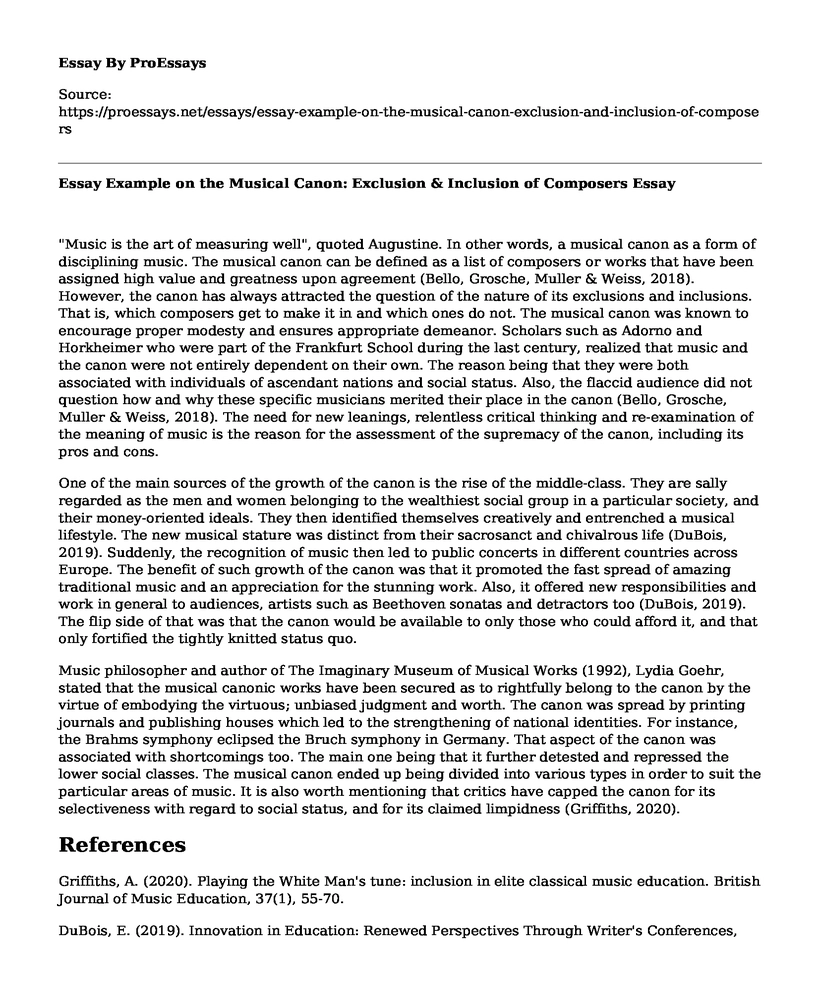"Music is the art of measuring well", quoted Augustine. In other words, a musical canon as a form of disciplining music. The musical canon can be defined as a list of composers or works that have been assigned high value and greatness upon agreement (Bello, Grosche, Muller & Weiss, 2018). However, the canon has always attracted the question of the nature of its exclusions and inclusions. That is, which composers get to make it in and which ones do not. The musical canon was known to encourage proper modesty and ensures appropriate demeanor. Scholars such as Adorno and Horkheimer who were part of the Frankfurt School during the last century, realized that music and the canon were not entirely dependent on their own. The reason being that they were both associated with individuals of ascendant nations and social status. Also, the flaccid audience did not question how and why these specific musicians merited their place in the canon (Bello, Grosche, Muller & Weiss, 2018). The need for new leanings, relentless critical thinking and re-examination of the meaning of music is the reason for the assessment of the supremacy of the canon, including its pros and cons.
One of the main sources of the growth of the canon is the rise of the middle-class. They are sally regarded as the men and women belonging to the wealthiest social group in a particular society, and their money-oriented ideals. They then identified themselves creatively and entrenched a musical lifestyle. The new musical stature was distinct from their sacrosanct and chivalrous life (DuBois, 2019). Suddenly, the recognition of music then led to public concerts in different countries across Europe. The benefit of such growth of the canon was that it promoted the fast spread of amazing traditional music and an appreciation for the stunning work. Also, it offered new responsibilities and work in general to audiences, artists such as Beethoven sonatas and detractors too (DuBois, 2019). The flip side of that was that the canon would be available to only those who could afford it, and that only fortified the tightly knitted status quo.
Music philosopher and author of The Imaginary Museum of Musical Works (1992), Lydia Goehr, stated that the musical canonic works have been secured as to rightfully belong to the canon by the virtue of embodying the virtuous; unbiased judgment and worth. The canon was spread by printing journals and publishing houses which led to the strengthening of national identities. For instance, the Brahms symphony eclipsed the Bruch symphony in Germany. That aspect of the canon was associated with shortcomings too. The main one being that it further detested and repressed the lower social classes. The musical canon ended up being divided into various types in order to suit the particular areas of music. It is also worth mentioning that critics have capped the canon for its selectiveness with regard to social status, and for its claimed limpidness (Griffiths, 2020).
References
Griffiths, A. (2020). Playing the White Man's tune: inclusion in elite classical music education. British Journal of Music Education, 37(1), 55-70.
DuBois, E. (2019). Innovation in Education: Renewed Perspectives Through Writer's Conferences, Literary Theory, Supplements to the Western Literary Canon, and Representations of Fiction through Film.
Bello, J. P., Grosche, P., Muller, M., & Weiss, R. (2018). Content-based Methods for Knowledge Discovery in Music. In Springer Handbook of Systematic Musicology (pp. 823-840). Springer, Berlin, Heidelberg.
Cite this page
Essay Example on the Musical Canon: Exclusion & Inclusion of Composers. (2023, May 08). Retrieved from https://proessays.net/essays/essay-example-on-the-musical-canon-exclusion-and-inclusion-of-composers
If you are the original author of this essay and no longer wish to have it published on the ProEssays website, please click below to request its removal:
- The War Room Essay Example
- Annotated Bibliography: How Social Media Affects Self-Esteem?
- Paper Example on Zachman Framework
- Movie Analysis Essay on Jim Hubbard's United in Anger
- Harnessing the Power of Social Media for Business Growth - Essay Sample
- Essay Example on Egypt Uprising Aftermath: Protests Over Gov't Failure to Protect Minorities
- Paper Example on Citizenfour: NSA Exceeding Power & Compromising Security of People







